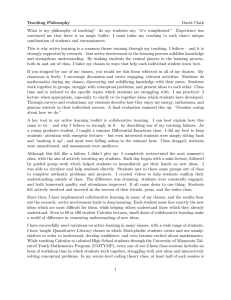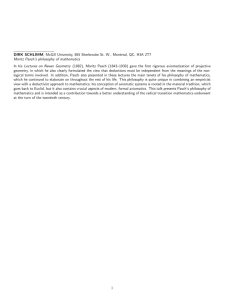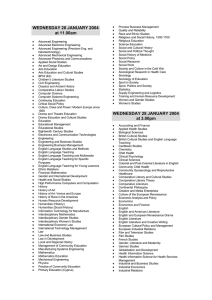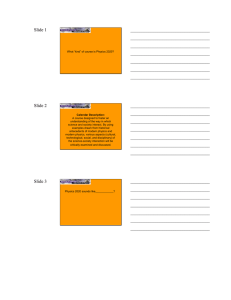Teaching Philosophy - Schreyer Institute for Teaching Excellence
advertisement
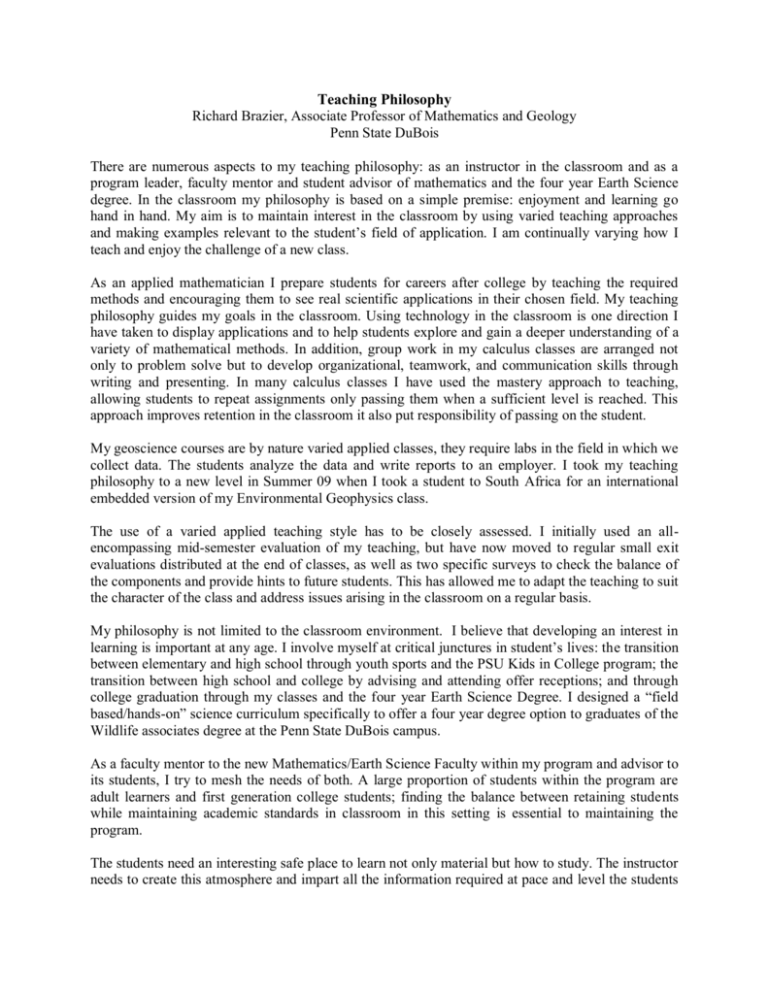
Teaching Philosophy Richard Brazier, Associate Professor of Mathematics and Geology Penn State DuBois There are numerous aspects to my teaching philosophy: as an instructor in the classroom and as a program leader, faculty mentor and student advisor of mathematics and the four year Earth Science degree. In the classroom my philosophy is based on a simple premise: enjoyment and learning go hand in hand. My aim is to maintain interest in the classroom by using varied teaching approaches and making examples relevant to the student’s field of application. I am continually varying how I teach and enjoy the challenge of a new class. As an applied mathematician I prepare students for careers after college by teaching the required methods and encouraging them to see real scientific applications in their chosen field. My teaching philosophy guides my goals in the classroom. Using technology in the classroom is one direction I have taken to display applications and to help students explore and gain a deeper understanding of a variety of mathematical methods. In addition, group work in my calculus classes are arranged not only to problem solve but to develop organizational, teamwork, and communication skills through writing and presenting. In many calculus classes I have used the mastery approach to teaching, allowing students to repeat assignments only passing them when a sufficient level is reached. This approach improves retention in the classroom it also put responsibility of passing on the student. My geoscience courses are by nature varied applied classes, they require labs in the field in which we collect data. The students analyze the data and write reports to an employer. I took my teaching philosophy to a new level in Summer 09 when I took a student to South Africa for an international embedded version of my Environmental Geophysics class. The use of a varied applied teaching style has to be closely assessed. I initially used an allencompassing mid-semester evaluation of my teaching, but have now moved to regular small exit evaluations distributed at the end of classes, as well as two specific surveys to check the balance of the components and provide hints to future students. This has allowed me to adapt the teaching to suit the character of the class and address issues arising in the classroom on a regular basis. My philosophy is not limited to the classroom environment. I believe that developing an interest in learning is important at any age. I involve myself at critical junctures in student’s lives: the transition between elementary and high school through youth sports and the PSU Kids in College program; the transition between high school and college by advising and attending offer receptions; and through college graduation through my classes and the four year Earth Science Degree. I designed a “field based/hands-on” science curriculum specifically to offer a four year degree option to graduates of the Wildlife associates degree at the Penn State DuBois campus. As a faculty mentor to the new Mathematics/Earth Science Faculty within my program and advisor to its students, I try to mesh the needs of both. A large proportion of students within the program are adult learners and first generation college students; finding the balance between retaining students while maintaining academic standards in classroom in this setting is essential to maintaining the program. The students need an interesting safe place to learn not only material but how to study. The instructor needs to create this atmosphere and impart all the information required at pace and level the students can follow. Both need guidance in maintaining this balance and finding the right teaching methods for the faculty and student population. As a student advisor I work with student on their schedules regularly fitting the expertise of my faculty to the interests of the student. During a student’s time at college I also will foster “sparks of interest” through independent undergraduate research with me or any of my faculty. My faculty mentoring ranges from the formal, in class review and regular department meetings, to the casual, such as daily checks. As mathematics department head I have redesigned the algebra and pre-calculus classes. The student population ranges from students who have taken much higher level classes but only need this class to meet a requirement, to those that who really struggle with mathematics. The other aspect to the redesign is addressing the “when am I ever going to use this.” In spring, 2009 we moved 2 credits into a computer lab and added embedded peer tutors; helping those who need more individual assistance - one of my classes is completely self-paced. The last credit is in the classroom working through larger project applications in groups using topics relative to the students and their majors.


